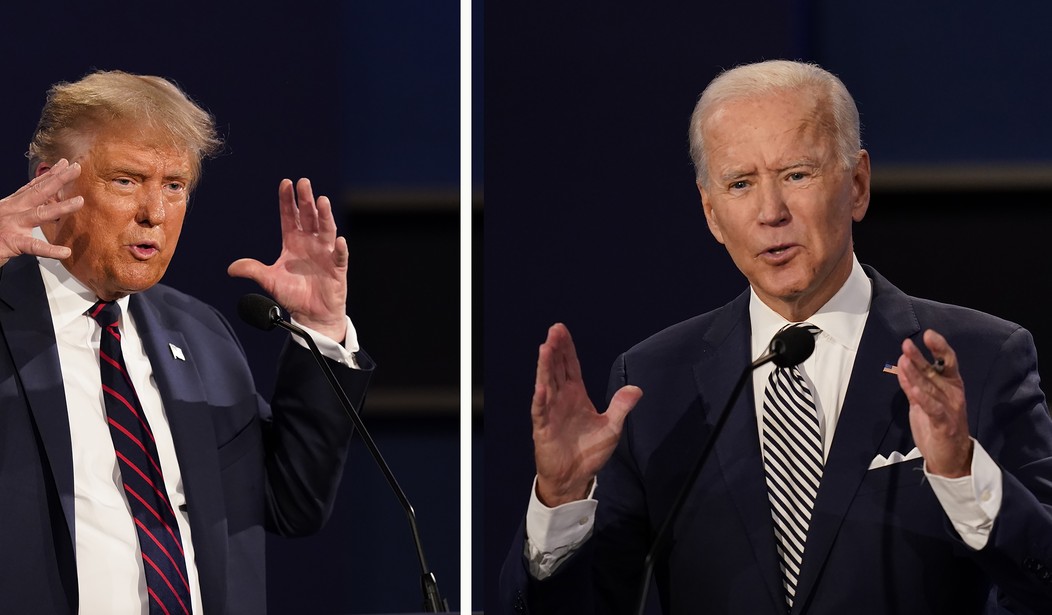The 2020 presidential election, pitting against each other two diametrically opposed visions of the American regime and way of life, is unprecedented in the modern history of the republic. On the merits -- the sustainability and survivability of what Abraham Lincoln called "that government of the people, by the people, for the people" -- it is perhaps the most important presidential election since the most recent threat to the American regime in 1860. The reality is that no one alive today has seen the legal, political and cultural foundations of this great nation more besieged than it is now by the destructive, intersectional, "woke" forces of the radical left.
But in this most chaotic of years, characterized by a global pandemic and insurrectionist violence of the most sordid sort rocking the nation's urban corridors, there are a myriad of other unique factors that risk undermining public confidence in the integrity of our quadrennial presidential election. Due to the widespread fear of in-person voting due to COVID-19, as many as half of the overall ballots -- disproportionately consisting of Democratic voters -- cast this year could be mailed in. Risking a pall cast over the entire process, a recent Washington Post analysis found that roughly 5% of all mail-in ballots fail to result in a counted vote, due to either fraud, a late postmark or an invalid signature. Overall, what is now impending is unlike anything our electoral system has ever handled, and there are hundreds of election-related lawsuits currently winding their way through the federal courts.
Recently, I was one of 35 participants in a wargame election simulation, co-hosted by the Claremont Institute and the Texas Public Policy Foundation, which assigned roles and sought to game out various possible scenarios for the 79 days from Election Day 2020 to Inauguration Day 2021. According to the wargame, in the likely probability of an ambiguous result on Nov. 3, the ubiquity of underfunded/understaffed state ballot-counting infrastructures and the extraordinary number of nationwide election-related lawsuits could lead to domestic unrest, foreign interference and a public crisis of faith in our electoral and governmental legitimacy.
Recommended
Exacerbating that public crisis of faith would be a repeat of the 2000 presidential election -- wherein the election is ultimately decided by the U.S. Supreme Court. Perhaps, like in Bush v. Gore, it might even be decided by a bare 5-to-4 Court majority. But there is an extraordinarily straightforward constitutional path to mitigating the prospects of such a fraught, bleak outcome. Although the election litigation now unfolding throughout the states oftentimes entails tortured, labyrinthine legal reasoning, a dissent this week in an en banc Fourth Circuit case out of North Carolina provides the roadmap for a salutary path forward -- as both a matter of law and as a matter of salving the political fractiousness of a nation increasingly teetering on the brink.
As Judge J. Harvie Wilkinson III wrote on behalf of the three dissenting judges in Wise v. Circosta (aside: Why were all three of President Donald Trump's nominees to the Fourth Circuit, including the highly touted Judge Allison Jones Rushing, in the misguided majority?), the Constitution provides, in unmistakable fashion, a clear binary question reviewing judges ought to ask themselves in order to determine whether any particular election regulation this year -- pertaining to mail-in ballot postmark deadlines, ballot drop box distributions and so forth -- meets constitutional muster. Consider the elections clause of Article I, Section 4 of the Constitution: "The times, places and manner of holding elections for Senators and Representatives, shall be prescribed in each state by the legislature thereof." As Wilkinson wrote, the Constitution "clearly and explicitly delegates" the power over managing and regulating state elections not to any court, not to any governor and not to any statewide election board. Rather, the exclusive source of power for managing and regulating the "manner of holding elections" is the plenary power that resides in the state legislatures.
Put another way, federal judges throughout the country should follow one exceedingly simple and dispositive legal rule in adjudicating the myriad of lawsuits unfolding, and yet to unfold, pertaining to all things election-related. If a regulation is the product of the state legislature, then it is constitutional (pending consideration of any possible heightened criteria emanating from other legal sources, such as the various states' own constitutions). If a regulation is the product of any rulemaking body other than a state legislature, though, it is invalid.
Widespread judicial acceptance and utilization of the elections clause of Article I, Section 4 is not merely a proper application of black-letter law, though. If implemented -- including, if need lamentably be, at a Bush v. Gore-style final Supreme Court case -- it could go long a way toward defusing partisan tensions and solidifying electoral legitimacy due solely to the fact that its legal reasoning is so readily accessible and easily understood by lawyers and laymen alike. Given the tumult that we are likely to see unfold before our eyes over the next few weeks, that would be just what the doctor ordered.

























Join the conversation as a VIP Member